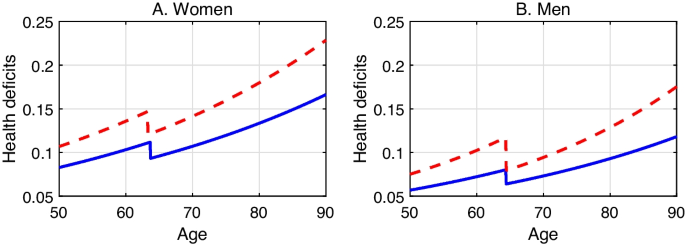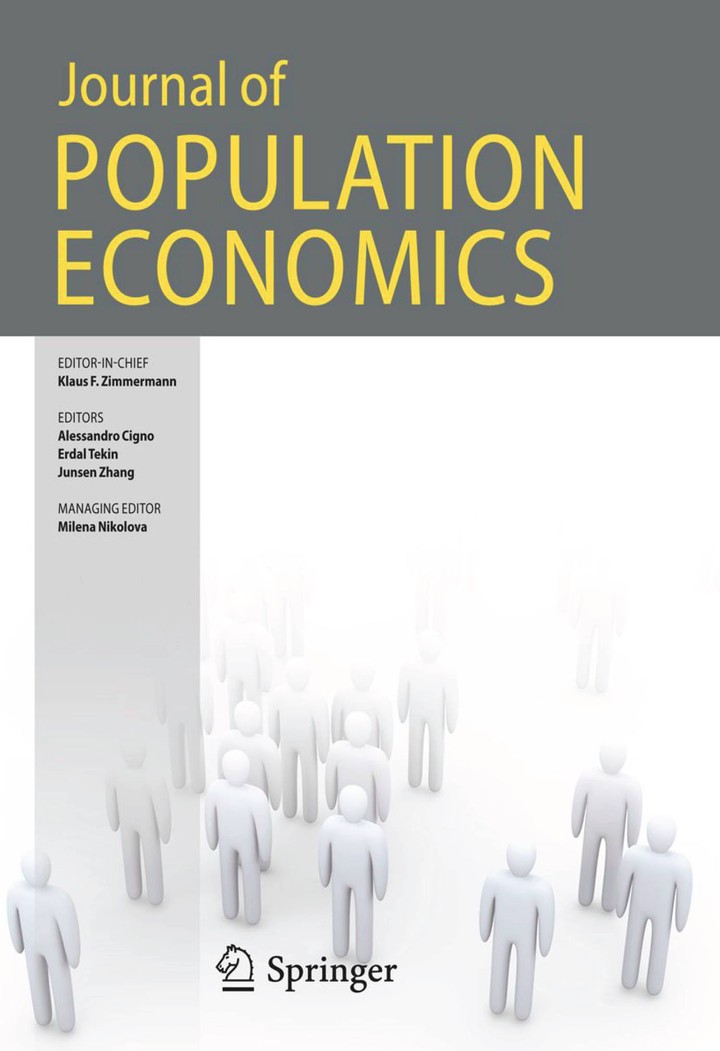Health and aging before and after retirement
IF 3
2区 经济学
引用次数: 7
Abstract
Abstract We investigate occupation-specific aging patterns before and after retirement and test the level and rate effects of occupation predicted by the health capital model and the health deficit model. We use five waves of the Survey of Health, Aging, and Retirement in Europe (SHARE) and construct a frailty index for elderly men and women from 10 European countries. Occupational groups are classified according to low vs. high education, blue vs. white collar, and high vs. low physical or psychosocial job burden. Controlling for individual fixed effects, we find that, regardless of the classification used, workers from the first (low-status) group display more health deficits at any age and accumulate health deficits faster than workers from the second (high-status) group. We instrument retirement by statutory retirement ages (“normal” and “early”) and find that the health of workers in low-status occupations benefits greatly from retirement, whereas retirement effects for workers in high-status occupations are small and frequently insignificant. In support of the health deficit model, we find that the health status of individuals from low- and high-status groups diverges before and after retirement.

退休前后的健康与衰老
摘要本研究考察了退休前和退休后的职业老龄化模式,并检验了健康资本模型和健康赤字模型预测的职业水平和比率效应。我们利用欧洲健康、老龄化和退休调查(SHARE)的五波数据,为来自10个欧洲国家的老年男性和女性构建了一个衰弱指数。职业群体根据教育程度高低、蓝领与白领、身体或心理工作负担高低进行分类。控制个体固定效应,我们发现,无论使用何种分类,第一组(低地位)的工人在任何年龄都表现出更多的健康缺陷,并且比第二组(高地位)的工人积累健康缺陷的速度更快。我们通过法定退休年龄(“正常”和“提前”)来衡量退休,发现低地位职业的工人的健康从退休中受益匪浅,而高地位职业的工人的退休影响很小,而且往往微不足道。为了支持健康赤字模型,我们发现低地位群体和高地位群体的个体在退休前和退休后的健康状况存在差异。
本文章由计算机程序翻译,如有差异,请以英文原文为准。
求助全文
约1分钟内获得全文
求助全文
来源期刊

Journal of Population Economics
Multiple-
CiteScore
9.60
自引率
6.60%
发文量
50
期刊介绍:
The Journal of Population Economics is an international quarterly that publishes original theoretical and applied research in all areas of population economics.
Micro-level topics examine individual, household or family behavior, including household formation, marriage, divorce, fertility choices, education, labor supply, migration, health, risky behavior and aging. Macro-level investigations may address such issues as economic growth with exogenous or endogenous population evolution, population policy, savings and pensions, social security, housing, and health care.
The journal also features research into economic approaches to human biology, the relationship between population dynamics and public choice, and the impact of population on the distribution of income and wealth. Lastly, readers will find papers dealing with policy issues and development problems that are relevant to population issues.The journal is published in collaboration with POP at UNU-MERIT, the Global Labor Organization (GLO) and the European Society for Population Economics (ESPE).Officially cited as: J Popul Econ Factor (RePEc): 13.576 (July 2018) Rank 69 of 2102 journals listed in RePEc
 求助内容:
求助内容: 应助结果提醒方式:
应助结果提醒方式:


